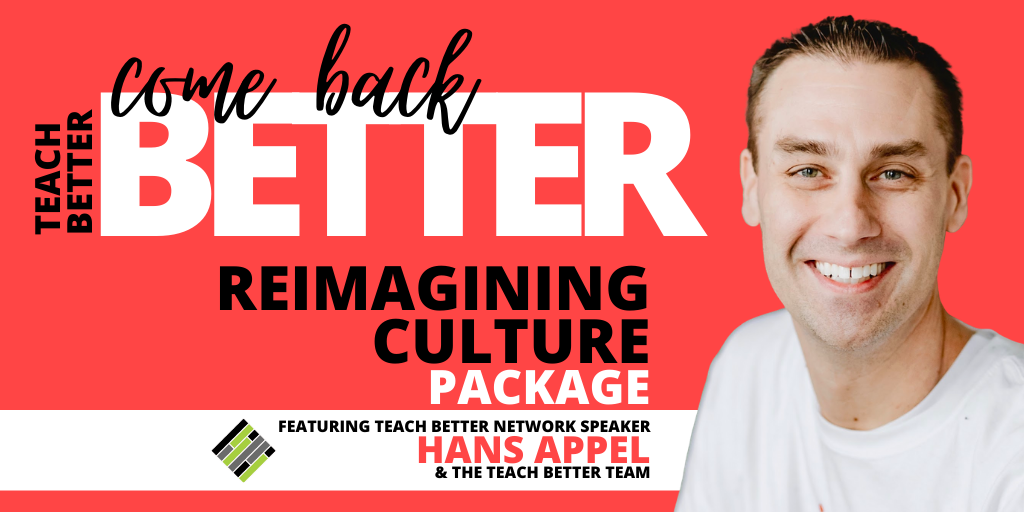TL;DR:
- Reimagine school as a verb with these five tips.
- Start with defining the problem. We need to focus on more than preparing students for the next grade; we need to focus on the necessary human skills of success.
- Reflection: The pandemic has forced us to relook at the whole learner through a metacognitive lens.
- Establish a growth mindset to reimagine classroom, school, or district culture and climate a little better every day.
- Find new energy to build culture. Culture is how people habitually behave so the way to impact culture is to impact the people inside the culture.
- We need a detailed plan. It will require extensive reflection and careful work. You’ll need a school-wide framework to bring this vision into existence.
“You must unlearn what you have learned.”
– Yoda
Reimagine School – Tip #1: Define the Problem
For years, society has agreed that school is a place for educating children. As a physical, brick-and-mortar institute of learning, we’ve sent generations of youth to explore academic content in the hopes of college prep and work-force readiness. Families have entrusted their prized loved ones into these tried and true buildings of instruction filled with assessment, grades, and diplomas.
Oh, sure, there have been hints of an explosive volcano of change ready to erupt in education but the most Future Driven thought leaders lacked the gift of timing to reinvent the definition of school through an Innovator’s Mindset. For years, society managed to fend off Google, YouTube, and social media’s impact on education. Neither Title IX laws, LBGTQ+ policies nor the undeniable crisis of youth mental health would be enough to create transformational change. From the civil rights movement to Black Lives Matter, we as a society simply refused to accept that time was upon us to reimagine school.
For nearly 1400 years, school has been a noun. And while school culture has become a hot topic in the last 50 years, much of what school has always been, still was. Sit and get. Early elementary was a place filled with curiosity. Upper elementary focused on getting students prepared to endure the middle grades. Middle school was simply a survival test. And high school was all about credits and transcripts.
I believe that education, at its highest level, is about inspiring others to discover and develop their joy. Click To Tweet
The only culture many educators had time for was the academic learning culture—getting them ready for the next grade or big test.
Colleges, employers, and the best social scientists in the world have begged—SCREAMED—for school to focus on the necessary human skills of success. Yet we as a people have resisted. The research has loudly suggested that if we only focus on academics, we’re only giving students 30-50% of what they need to be successful after high school (Cook, 2017).
We cast aside the growing body of evidence showing that kids were more isolated, stressed out, and traumatized within an unfair dominant culture lens of homogeneity. The inequity of youth’s humanism had been reduced to data points like GPAs and test scores.
Until now…
Reimagine School – Tip #2: Reflection
In March 2020, education as we know it paused, stopped, and hopefully with YOUR HELP, changed. How ironic that the moment we stopped seeing our learners sitting at desks in front of us, was the moment many of us actually started SEEING our learners!
Thanks to a global pandemic, our world has effectively been given a redo on interpreting the ideas of learning, school, and education. As a unified world against the effects of COVID-19, we have all been forced to relook at the whole learner through a metacognitive lens. These self mantras can NO LONGER exist:
- “I teach math not emotional regulation.”
- “I went to school for science not social skills.”
- “Character education can’t be a priority for me—that’s on mom and dad.”
- “I don’t have time to worry about relationships and growth mindset; I have standards to cover.”
Disclaimer: If you’ve patiently bided your time, waiting until we could all get back to our old normal—this is NOT the blog for you. And reimagining your school’s culture might not be for you either.
If you’re happy with good enough, the old days, and how it used to be…you’re not ready to renovate your culture and climate. [Only 15% of organizations who embark on cultural change are successful.] I suppose there’s comfort in complacency.
Reimagine School – Tip #3: Establish a Growth Mindset
Cultural Change Agility is the ability of a person, cohort, or organization to tolerate unknown levels of discomfort. And the #1 predictor of agility is a growth mindset.
Are you driven to make your classroom, school, or district culture and climate a little better every day? At Teach Better, we support you to be BETTER today than yesterday and BETTER tomorrow than today. But here’s the big catch—YOU GOTTA WANT TO CHANGE!
If you recognize the cracks and are eagerly awaiting possibilities to help students from falling deeper into them, then join me in a life-altering quest to build an army of thriving learners.
I believe that education, at its highest level, is about inspiring others to discover and develop their joy.
Education is an amalgamation of complex human challenges such as equity, poverty, and trauma, and its solution will not be found in an a la carte menu of quick fixes. Reimaging school requires purposefully diverse school teams led by multidisciplinary thought leaders driven to reach and teach the whole learner.

Reimagine School – Tip #4: Finding NEW Energy
Ever wondered why that infectious optimism from a random acts of kindness week, a heartfelt keynote speaker, or contagious energy of a new exciting program don’t actually lead to sustainable change? The magic isn’t found in curriculum, content, or compliance. While climate (how things feel around here) might be altered for a day, week, or months, culture runs much deeper. Culture is how people habitually behave. The secret sauce to culture is found in the people who breathe life into everything in the school. Thus, the only way to impact culture is to impact the people inside the culture…
Does your school culture have the power to evoke Tears of Joy?
As the Director of Culture for the Teach Better Team, I’m on a mission to walk hand in hand with educators who are ready to implement a systemic movement of joy through big ideas like character, excellence, and community.
Reimagine School – Tip #5: Planning
It’s going to require extensive reflection, careful work, and a detailed plan. You’ll need a school-wide framework to bring this vision into existence. I refuse to insult your intelligence and pretend that a band-aid will solve the deep mental health laceration of social emotional and character avoidance that our society tolerated. Or how education’s singular focus on old-school academics managed to leave that cut infected. Implementation science tells us it’s going to take 3-5 years of consistent effort to stitch up our post-pandemic wound. This will take intentional educators in partnership with parents, students, and local businesses.
But this work can be done. THIS WORK HAS TO BE DONE.
Educators will foster:
- A system of mastery learning designed to meet the individual academic, social, and emotional needs of each student.
- A way of feeling connected to something bigger than oneself.
- A praxis to the fountain of joy-filled living and learning.
- An outlet to create, explore, and develop one’s passions.

School MUST become a verb with Award Winning Culture as its powerful adverbial guide.
Reimagine Better. Teach Better.
Click here to see the full blog series!
About Hans Appel
Hans Appel is an educator, speaker, and writer deeply committed to inspiring the whole child. He’s the author of, Award Winning Culture: Building School-Wide Intentionality and Action Through Character, Excellence, and Community. Additionally, he’s the Director of Culture for the Teach Better Team, co-host of the Award Winning Culture podcast, and the Co-Creator of Award Winning Culture.
Hans is also a member of the Teach Better Speakers Network.




